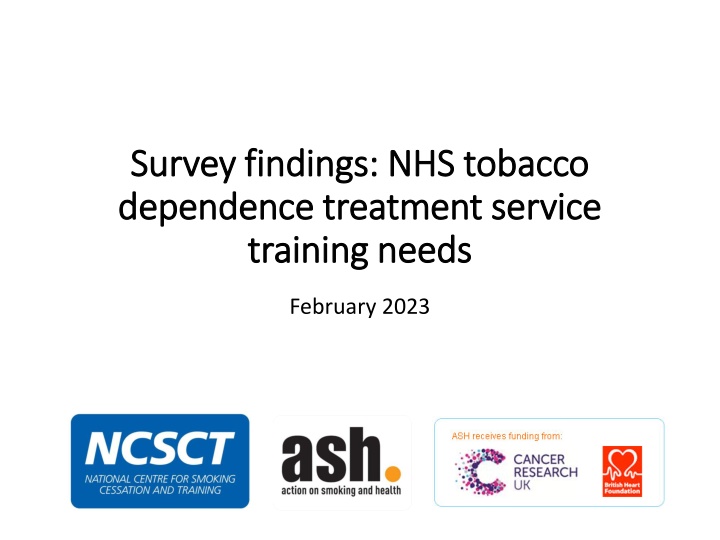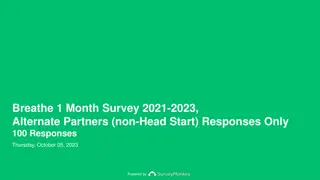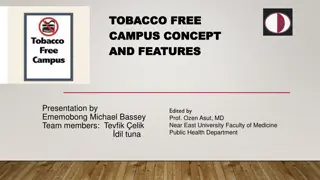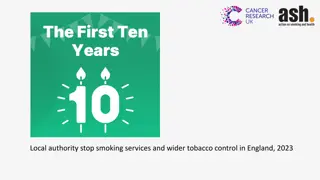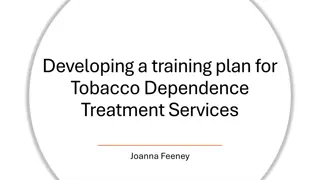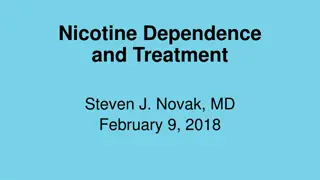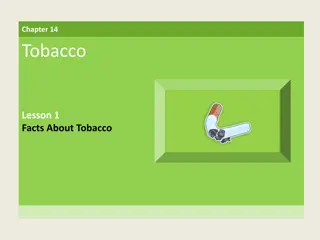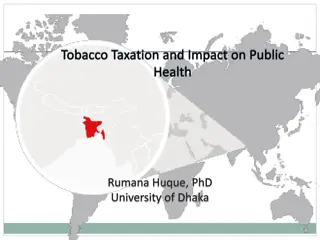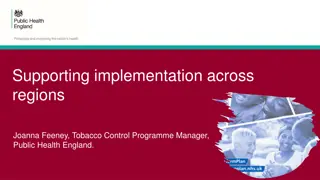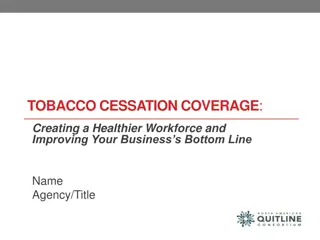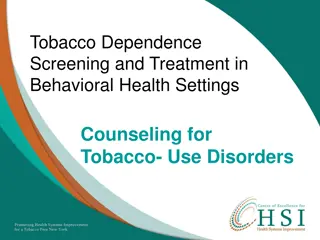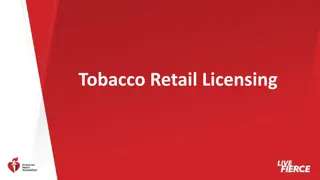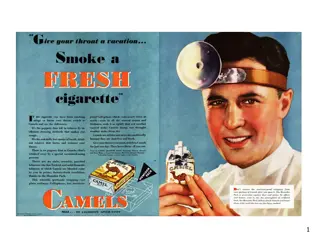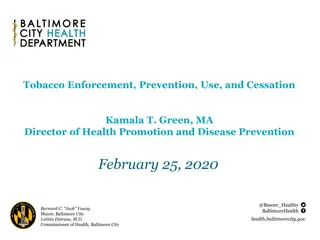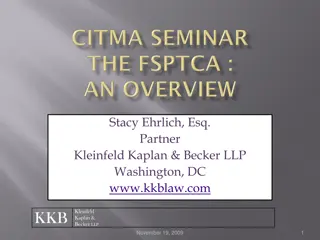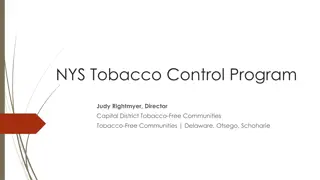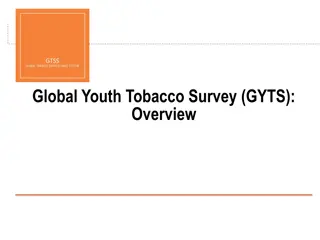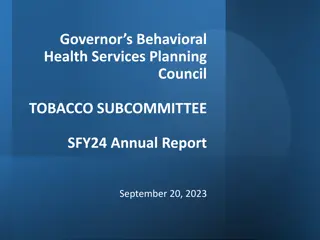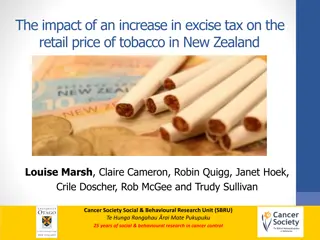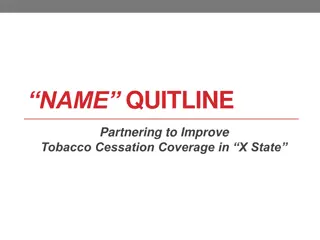NHS Tobacco Dependence Training Needs Survey
Conducted by ASH and NCSCT, this survey explores the training needs for tobacco dependence treatment in NHS trusts/ICSs. Key findings reveal a demand for national training standards and resources across different healthcare pathways. Respondents emphasize the value of a minimum training standard, national curricula, and leadership training in evidence-based tobacco treatment delivery. Various preferences for training formats and durations were highlighted, indicating a need for tailored approaches to address these needs effectively.
Uploaded on Apr 16, 2025 | 1 Views
Download Presentation

Please find below an Image/Link to download the presentation.
The content on the website is provided AS IS for your information and personal use only. It may not be sold, licensed, or shared on other websites without obtaining consent from the author.If you encounter any issues during the download, it is possible that the publisher has removed the file from their server.
You are allowed to download the files provided on this website for personal or commercial use, subject to the condition that they are used lawfully. All files are the property of their respective owners.
The content on the website is provided AS IS for your information and personal use only. It may not be sold, licensed, or shared on other websites without obtaining consent from the author.
E N D
Presentation Transcript
Survey findings: NHS tobacco Survey findings: NHS tobacco dependence treatment service dependence treatment service training needs training needs February 2023
Summary Survey conducted by ASH and NCSCT looking at tobacco dependency treatment training needs in NHS trusts/ICSs Survey was active from 14/12/22 to 27/1/23 The 124 respondents were responsible for delivery of training in the following settings: Acute: 69 Mental health: 27 Maternity: 56 Some respondents are responsible for delivery of training for multiple trusts/settings. Non-responses are excluded from the percentages. For further information please open the notes section of these slides throughout.
Key findings There is clear demand for a national training standard and resources across all pathways (acute, maternity, mental health) Despite some areas having already developed training resources, respondents indicated that national standard and training resources would be valued In-house training capacity is limited in many trusts Training on vaping will be needed to support trusts which have included vaping in their stop smoking offer
National training standard and resources There is clear demand for a national training standard and resources across all pathways Over 90% of respondents across all pathways agreed that: a minimum training standard with specific learning objectives would be useful there is value in having a national training curricula that can be adapted by local trainers of respondents agreed that leadership from their trust tobacco dependence service would benefit from additional training in evidence-based tobacco treatment delivery in the acute care setting. 74%
Training delivery 53% of respondents preferred a combination of formats for training resources (mixture of face-to-face and online) of respondents think regular webinars directed to tobacco treatment advisors and prescribers would be extremely or very valuable for their trust. 92% What duration of training would be optimal for your tobacco dependency advisors? Half a day (37%) 1 day (32%) 2 days (18%)
Training capacity What describes best your internal training capacity in tobacco treatment that you have in your trust or region? 100% 8% 90% 20% 21% 35% 80% 70% 54% 34% 39% 60% 50% 31% 40% 30% 31% 32% 29% 27% 20% 10% 13% 9% 8% 8% 0% Acute pathway Maternity pathway Mental health pathway All pathways None Very little Some training capacity In-house trainer with expertise in tobacco treatment
Training delivery of respondents say training to staff will be delivered by their in-house training team BUT only ~20% say they have an in-house trainer with expertise in tobacco control. 43% 28% of respondents say training to staff will be delivered by externally contracted training organizations. 28% of respondents were uncertain who would deliver training to staff
Capacity supervision and mentorship Our tobacco treatment team has adequate capacity/expertise to provide supervision, mentorship, and guidance for staff in the tobacco treatment advisor role. All pathways 14% 42% 22% 18% 5% Mental health pathway 7% 61% 6% 26% Maternity pathway 7% 41% 28% 20% 4% Acute pathway 15% 44% 22% 12% 7% 0% 10% 20% 30% 40% 50% 60% 70% 80% 90% 100% Strongly agree Agree Neither agree nor disagree Disagree Strongly disagree
Capacity supervision and mentorship (NRT) Our team has adequate capacity/expertise to provide supervision, mentorship, and guidance for staff who will be prescribing nicotine replacement therapy. All pathways 18% 32% 16% 27% 7% Mental health pathway 25% 29% 17% 29% Maternity pathway 11% 37% 13% 33% 7% Acute pathway 22% 29% 17% 24% 8% 0% 10% 20% 30% 40% 50% 60% 70% 80% 90% 100% Strongly agree Agree Neither agree nor disagree Disagree Strongly disagree
Staffing Which best describes staff you have recruited to be tobacco dependency treatment advisors in acute settings? (all pathways) Existing NHS staff with limited experience of smoking cessation (32%) Limited experience of NHS or smoking cessation services (19%) Staff experienced in NHS and smoking cessation services (18%) Clear need for a training standard to support core competencies
In-house training resources of respondents said their trust or region had developed local training resources for staff who deliver tobacco dependency treatment. 59% These training resources were a mixture of e-learning and traditional Most common topic was delivering VBA, followed by prescribing stop smoking medications, nicotine addiction and tobacco treatment specialist resources 41% of respondents do not have access to local training resources for staff delivering tobacco dependency treatment
Stop smoking aids: NRT Will your trust be offering nicotine replacement therapy as a stop smoking aid to patients as part of the inpatient tobacco treatment service? All pathways 94% Mental health pathway 100% Maternity pathway 91% Acute pathway 97% 0% 10% 20% 30% 40% 50% 60% 70% 80% 90% 100% Yes No Don't know
Stop smoking aids: e-cigarettes Will your trust be offering vapes (e-cigarettes) as a stop smoking aid to patients as part of the inpatient tobacco treatment service? All pathways 30% 49% 21% Mental health pathway 79% 13% 8% Maternity pathway 26% 41% 33% Acute pathway 14% 68% 19% 0% 10% 20% 30% 40% 50% 60% 70% 80% 90% 100% Yes No Don't know
